
A Guide to Outsourced Lead Generation for 2025

Is your sales team bogged down trying to find and nurture the right leads? You’re not alone. As B2B buying cycles lengthen and decision-makers become harder to reach, traditional in‑house lead generation often struggles to keep pace. In fact, 57% of sales leaders and managers say that competition has increased since last year, and another 35% point to automation reshaping how buyers now interact with vendors.
This is where outsourced lead generation steps in. Done right, it doesn’t just fill your pipeline with more names; it delivers better-qualified prospects, frees up your internal team, and gives you access to tools, expertise, and data-driven strategies that can be hard to build internally.
In this guide, you’ll learn why outsourcing lead generation has evolved from a tactical cost-saver into a strategic growth lever. We’ll cover how it works, what to expect from a trusted partner, and the key questions to ask before making your decision. By the end, you’ll understand how to turn outsourced lead generation into a foundation for sustainable sales growth — and a smarter way to stay competitive in 2025.
What is B2B Lead Generation and Why is it Important?
B2B lead generation is the process of identifying and attracting potential business clients who are likely to benefit from your products or services. It involves targeted outreach, qualifying prospects, and nurturing relationships to move them through the sales funnel. For companies aiming for scalable growth, B2B lead generation ensures that the sales team has a steady stream of opportunities to close.
Importance of Lead Generation for B2B Companies
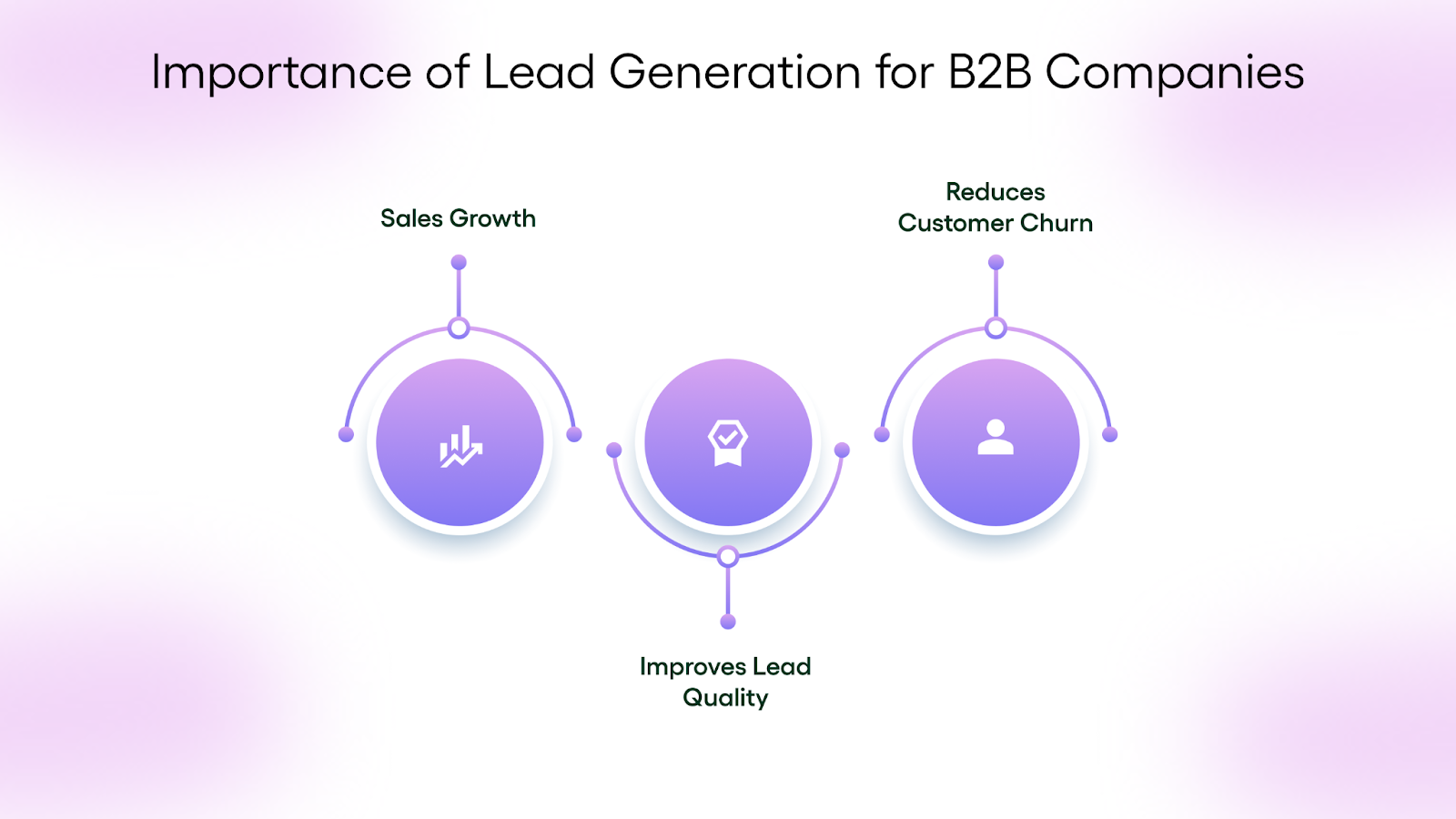
Lead generation is the backbone of any successful B2B business. For sales teams, without a steady flow of qualified leads, the sales pipeline quickly dries up. That’s why generating high-quality leads should always be a priority; it keeps the momentum going and ensures consistent revenue growth. Here’s why lead generation matters so much for B2B companies:
- Fuels Sales Growth: Without fresh leads, sales teams struggle to hit their targets. A continuous flow of qualified prospects ensures your team always has opportunities to pursue.
- Improves Lead Quality and Quantity: Effective lead generation strategies don’t just bring in volume. They bring in the right leads, reducing wasted effort on unqualified prospects.
- Reduces Customer Churn: A solid lead generation process helps businesses avoid customer churn by continuously bringing in fresh prospects to replace lost clients.
Without a solid lead generation strategy, your sales team may waste time on unqualified leads, miss opportunities, and ultimately fall short of their targets. There are two ways of generating leads: in-house lead generation, where you have a full-fledged marketing team on board that produces, qualifies, and manages leads. The other one is where you outsource the whole process and get the cream of the crop. Let’s explore how outsourcing lead generation works.
Read: How Investing in Email Marketing Can Transform Your Business and Boost ROI
What is Outsourcing Lead Generation?
Outsourced lead generation is the practice of partnering with a specialized agency or service to handle the process of identifying, qualifying, and nurturing potential leads. Instead of relying exclusively on internal staff, businesses can tap into external expertise, technology, and dedicated resources to build a pipeline of high‑quality prospects.
For many companies, this approach makes lead generation more efficient and cost‑effective. It removes the burden of recruiting, training, and managing an in‑house team while allowing internal staff to focus on higher‑impact priorities, like closing deals and building long‑term customer relationships.
Outsourced lead generation is ideal for organizations that want to scale their sales efforts quickly, adapt to market shifts, or simply optimize how their team spends its time. And when done right, it can help transform lead generation from a challenging, resource‑draining activity into a seamless extension of your sales engine.
If you’re exploring this route, a trusted partner like The Lead Market (TLM) can help design and manage a lead generation program tailored to your business needs.
In-house vs. Outsourcing Lead Generation
Lead Generation Services You Can Outsource
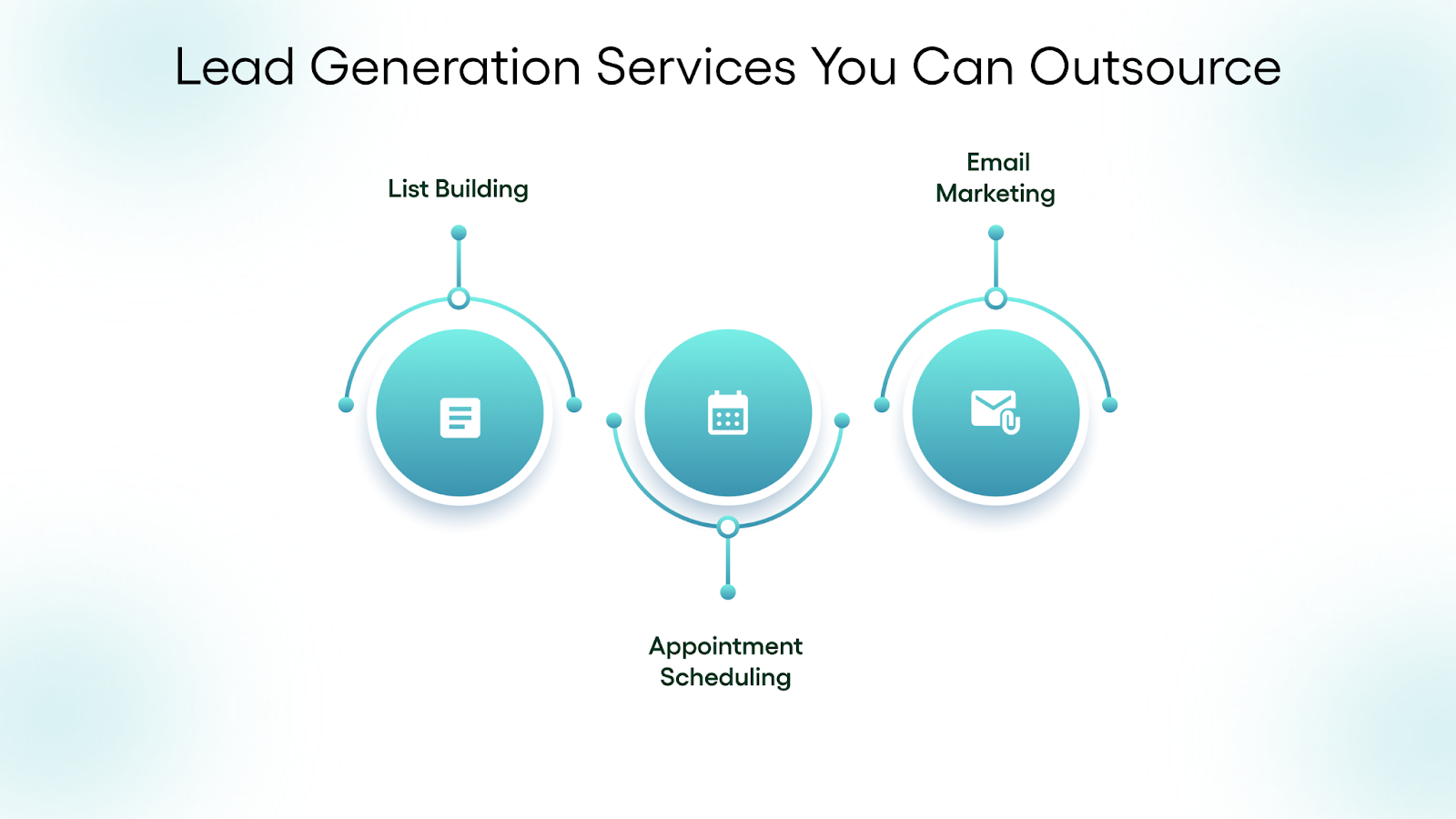
Several lead generation services can be outsourced to improve efficiency and ensure your sales team focuses on what matters most: converting high-quality leads. Here's a look at the key services you can consider outsourcing.
1. List Building
Outsourcing list building allows you to focus on engaging the right prospects. It ensures that your database is filled with accurate, high-value leads who match your ideal customer profile (ICP).
2. Appointment Scheduling
Outsourcing appointment setting ensures that your sales team only engages with qualified leads. Specialized teams handle the process of identifying and securing meetings, allowing your team to focus on closing deals.
For MSPs, sorting through lists and booking appointments can be time-consuming and inefficient. TLM (The Lead Market) streamlines this with proprietary tools for demand generation, targeted campaigning, and appointment scheduling, all under one seamless dashboard, helping you convert prospects into profits. Let’s talk about how TLM can optimize your appointment scheduling.
3. Email Marketing
Outsourcing email marketing provides tailored, targeted campaigns that effectively engage prospects while maintaining compliance with the CAN-SPAM Act for legal and ethical outreach. In fact, 78% of companies use email marketing strategy to generate leads, 73% use event marketing, and 67% use content marketing to generate leads.
However, before making the transition, it’s crucial to understand the key factors to consider. Let’s explore what you should keep in mind when deciding whether outsourcing is the right choice for your business.
When to Consider Outsourcing Lead Generation?
There’s no one-size-fits-all solution when it comes to lead generation. Some businesses thrive with an in-house team, while others find that outsourcing is the key to scaling more quickly and efficiently. The decision between outsourcing or handling lead generation internally often depends on various factors. Let’s take a closer look at when keeping things in-house works best and when outsourcing might be the more strategic choice.
When In-House Lead Generation Works Best
In-house lead generation can be highly effective for businesses that have the resources and the bandwidth to manage it. Here are a few scenarios where in-house may be the right approach:
- Complete Control Over Brand and Strategy: If your team values full control over messaging and brand alignment, in-house generation ensures everything stays aligned with your vision.
- Deep Product Knowledge: When your product requires specialized knowledge, an in-house team can leverage its understanding to craft more tailored and effective campaigns.
- Strong Alignment Between Sales and Marketing: In-house teams can be more in sync with sales, ensuring seamless transitions between lead generation and the sales process.
However, even with these benefits, in-house lead generation requires substantial recruitment, training, and technology investment, making it a challenging option for smaller businesses or those needing scalability.
When Outsourcing Lead Generation is the Smarter Choice
While in-house lead generation offers control and alignment, there are times when outsourcing becomes a better option. For many businesses, especially small to medium-sized companies, outsourcing lead generation can address several key challenges:
- Need to Scale Quickly: If your business is growing fast and you need to ramp up lead generation quickly, outsourcing can help you meet this demand without the long ramp-up time required for building an in-house team.
- Struggling with Lead Quality: When your sales team is overwhelmed with low-quality leads that don’t convert, it may be time to hand over lead generation to specialists who can focus on targeted outreach and higher-quality prospects.
- Lack of Internal Resources: Lead generation is resource-intensive. If your internal team is stretched too thin, outsourcing ensures the process is managed without overburdening your employees or disrupting your core operations.
- Pressure to Lower Costs: Outsourcing can reduce overhead costs associated with building and maintaining an in-house team, especially for small businesses that don’t have the budget to manage all aspects of lead generation in-house.
With outsourcing, many businesses find that they can maintain a hybrid approach, leveraging internal strategy while relying on outsourced execution for tasks like cold emailing, lead qualification, and appointment setting. This hybrid approach can often offer the best of both worlds, providing flexibility and expertise.
However, as with any business decision, outsourcing comes with its own set of advantages and challenges. Let’s explore the advantages and disadvantages of outsourcing lead generation.
Also read: Top 8 Outbound Lead Generation Strategies for 2025
Pros and Cons of Outsourcing Lead Generation
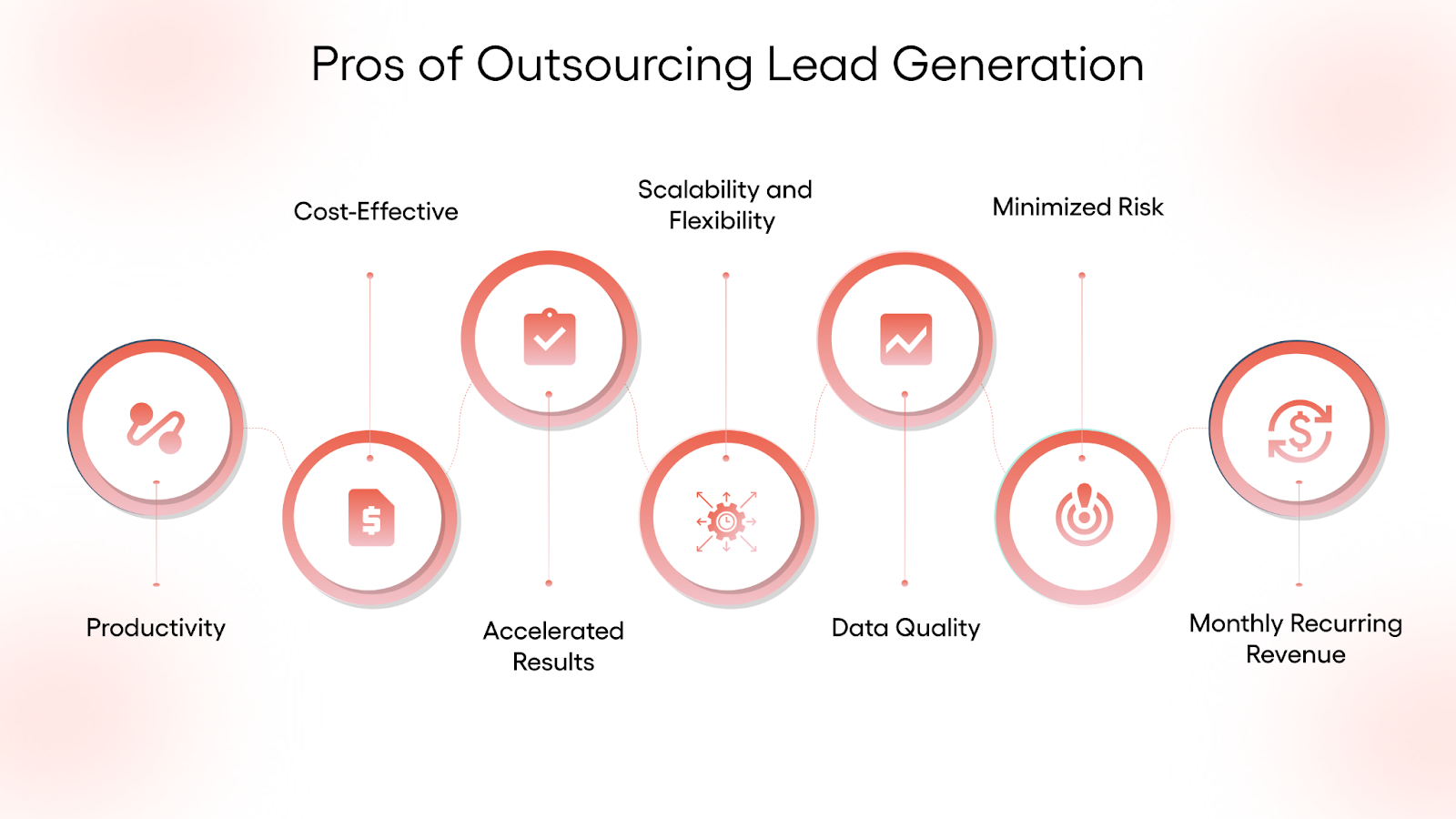
Outsourcing B2B lead generation has become a strategic move for many businesses looking to accelerate growth, optimize resources, and ensure a regular flow of quality leads. While outsourcing offers significant advantages, it also comes with its own set of challenges. Let’s break it down.
Pros of Outsourcing Lead Generation
1. Enhanced Efficiency and Productivity
Outsourcing lead generation allows your team to focus on high-priority tasks, like closing deals, while experts handle the research, qualification, and initial outreach. By focusing on these core tasks, your sales teams can work more efficiently and increase your organization's overall productivity.
2. Cost-Effective Approach
Building an in-house lead generation team involves significant overhead costs, including recruitment, training, technology, and ongoing salaries. Outsourcing cuts these costs by allowing you to pay for the leads generated rather than the entire infrastructure needed to manage the process.
3. Accelerated Results
Lead generation agencies have established systems and proven methods to generate results faster. While in-house teams may take months to build an effective process, an outsourced team can hit the ground running with campaigns tailored to your target market. This acceleration allows you to start seeing leads come through your pipeline much more quickly.
4. Scalability and Flexibility
Outsourcing allows you to scale your lead generation efforts as your business needs evolve. Whether you're preparing for a product launch, seasonal growth, or expanding into new markets, outsourcing allows you to adjust efforts without the complexities of hiring and training additional staff.
5. Improved Data Quality and Lead Targeting
Lead generation specialists have access to the latest tools and expertise to ensure your leads are of the highest quality. By outsourcing, you gain access to advanced data analytics and refined prospect lists, ensuring your sales team works with leads that are more likely to convert. This improves the quality of your outreach and increases your conversion rates.
6. Minimized Risk of Missed Opportunities
With a dedicated team managing your lead generation efforts, there’s less risk of missing valuable leads or letting prospects fall through the cracks. Outsourcing ensures consistent outreach and follow-ups, reducing the chances of losing out on potentially high-value opportunities.
7. Boosted Monthly Recurring Revenue (MRR)
Outsourcing lead generation ensures your sales pipeline remains full with quality leads. By focusing on the right prospects and targeting them effectively, outsourcing significantly increases your MRR, allowing your business to grow sustainably and steadily.
For example, a Pennsylvania-based MSP partnered with TLM to outsource its B2B lead generation. The MSP faced challenges in breaking into regulated markets like healthcare, where compliance is a critical requirement. By using TLM’s targeted outreach strategy, the MSP was able to connect with key decision-makers in life sciences firms, addressing specific pain points related to compliance, uptime, and data integrity.
Within just two months, this targeted campaign helped the MSP close a $20,000 MRR deal and secure a three-year managed services contract worth $720,000.
What set this partnership apart was TLM’s expertise in managing highly targeted campaigns and providing tailored solutions, leading to a much shorter sales cycle and a significant revenue boost. Book a call now to discuss how we can improve your MRR.
Cons of Outsourcing Lead Generation
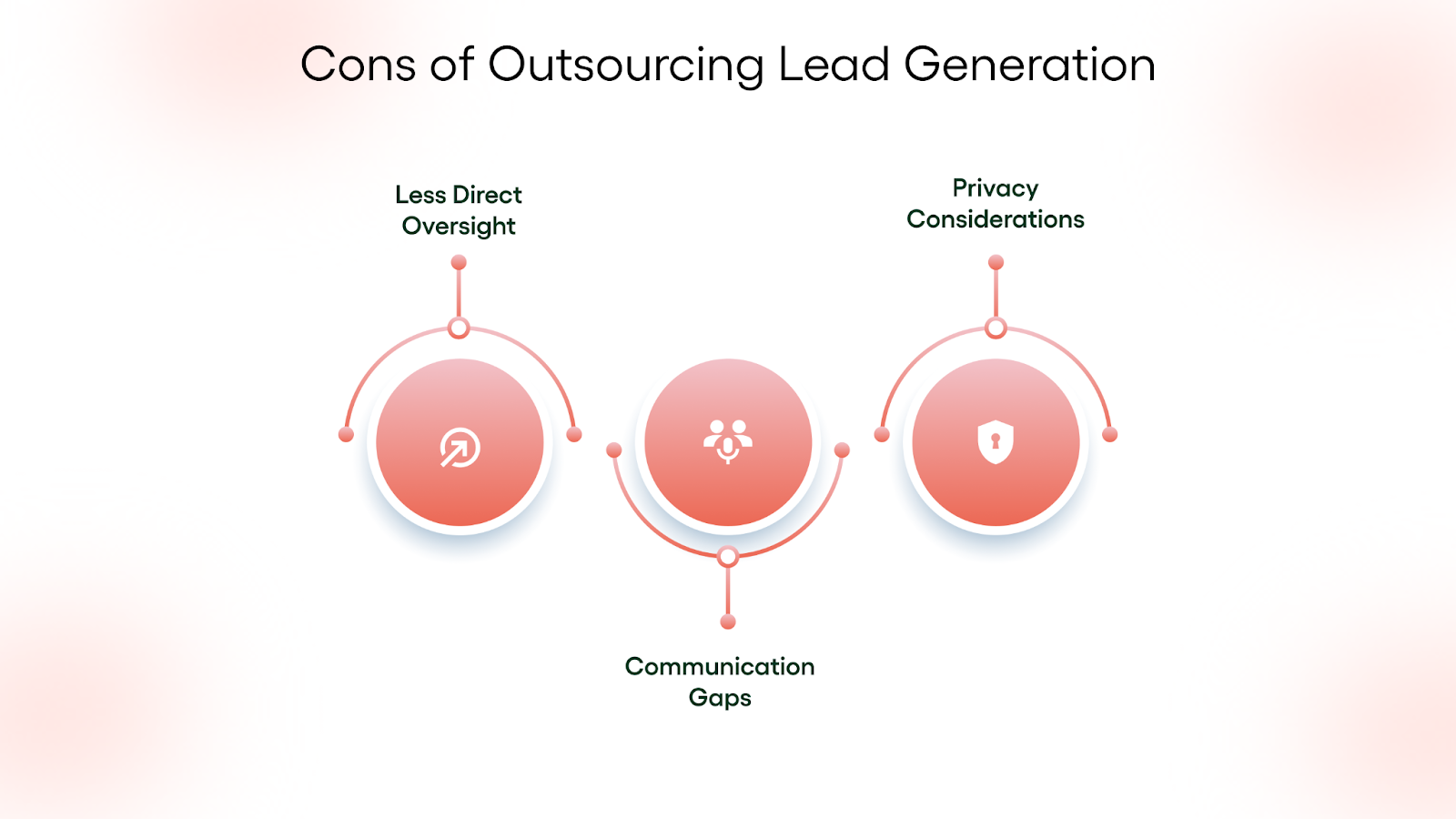
While outsourcing B2B lead generation offers many benefits, it also comes with challenges that businesses must consider carefully.
- Less Direct Oversight
Outsourcing means relying on an external team to carry your brand message. In some cases, this can feel like a loss of direct control, but with clear communication, strong onboarding, and regular alignment meetings, this is typically a manageable challenge. - Communication Gaps
If your outsourced team operates from a different time zone or location, you may experience delays in feedback or collaboration. However, most reputable providers have built their services around seamless communication and dedicated account support, making it easy to stay connected and aligned. - Data and Privacy Considerations
Outsourcing can raise questions about how customer data is handled, especially in industries with strict compliance requirements. The reality is that trusted outsourcing firms have robust data security protocols and adhere to global standards, making it feasible to protect sensitive information and mitigate risk.
Despite these challenges, many businesses have found outsourcing to be a successful strategy, especially with a trusted partner like TLM (The Lead Market). With that being said, if you decide to outsource, it is essential to find a reliable service provider for your business. Let’s now understand how to do that.
Also read: How Outsourcing Can Transform Small Businesses
How to Select the Right Lead Generation Partner for Your Business
Selecting the right lead generation partner can significantly enhance your sales process. Choosing the right partner is not just about outsourcing a task; it's about forging a relationship that can help your business grow consistently. Here’s how to make the right choice.
1. Domain-Specific Expertise
Experience in your specific industry is crucial when selecting a lead generation partner. A partner who understands your sector can craft messages and strategies that resonate with your target audience.
- Look for a partner who has worked with businesses similar to yours and understands the nuances of your market.
- Ensure they have the experience and tools to generate leads that align with your industry’s unique needs.
- Ask for examples of campaigns tailored to your industry to see how they’ve handled similar challenges.
2. Transparency and Clear Communication
A trustworthy partner will always maintain transparency in their strategies and processes. This means you’ll clearly understand how leads are generated and what to expect at each stage.
- Ensure they offer full insight into their lead generation process.
- Ask for clear examples of how they track and manage lead performance.
- Look for partners that offer easy access to reports and dashboards so you can monitor results in real-time.
At TLM, we believe in clear, open communication. Our clients can access real-time data and detailed campaigning data through our proprietary dashboard, so you’re always up to date.
3. Tailored Solutions to Fit Your Business
Every business has its own unique set of goals, challenges, and needs. The right lead generation partner will offer customized solutions rather than a one-size-fits-all approach.
- Ask how they will adapt their strategies to fit your specific goals and business objectives.
- Ensure that the partner can create a strategy that is aligned with your target audience and business needs.
- Ensure they’re flexible and open to evolving strategies as your business grows and changes.
4. Lead Quality Over Quantity
The effectiveness of your lead generation efforts relies on the quality of the leads, rather than simply the quantity. Make sure the partner you select is committed to generating high-quality leads with a strong potential to convert.
- Ask about their lead scoring process and how they ensure that only qualified leads reach your sales team.
- Make sure they have proven methods for nurturing and guiding leads through the sales funnel.
- Make sure they focus on lead quality rather than just quantity, as chasing volume can result in wasted time and effort.
5. Clear, Transparent Pricing
Before entering into any partnership, ensure the pricing structure is clear and transparent. A good lead generation partner will outline deliverables, timelines, and responsibilities from the start.
- Ensure that the pricing models are clear, whether they’re fixed fee, performance-based, or hybrid.
- Ensure there are no hidden charges and that the contract terms and conditions are clear and easy to understand.
- Discuss what services are included and how additional services will be billed.
TLM offers a flexible pricing structure to suit your needs, including Pay-Per-Appointment and Monthly Retainers. This ensures you’re paying for what matters most to your business, without surprises.
6. Proven Track Record and Client Testimonials
A reliable lead generation partner should have a proven track record of delivering results. It’s important to evaluate their history and success in helping other businesses grow.
- Look for a partner with a long history of satisfied clients and documented success.
- Check client reviews, case studies, and performance metrics to ensure they have consistently delivered results.
- Ask for references from similar businesses to understand their effectiveness better.
7. Compliance with Data Protection Rules
Ensuring that your lead generation partner complies with data protection regulations is crucial for safeguarding your reputation and minimizing risks.
- Ask about their knowledge of data protection laws like CAN-SPAM.
- Confirm that they follow best practices for data handling and client privacy.
- Ensure they provide clear information on protecting your data and customers' personal information.
By carefully evaluating the factors above, you can make an informed decision when choosing your lead generation partner. Apart from those, there is one more important factor you should consider while outsourcing lead generation: cost. Let’s discuss that in detail.
What is the Cost of Outsourcing Lead Generation?
The cost of outsourcing lead generation can vary widely depending on several factors. Evaluating the different pricing models can help you determine whether outsourcing is the right choice for your business.
Common Pricing Models:
- Cost Per Lead (CPL): The price you pay for each lead generated. This cost depends heavily on the industry and the quality of leads.
- Hourly Rates: Some lead generation agencies charge by the hour. This model is ideal for companies that need ad-hoc services or consulting.
- Pay-Per-Performance: In this model, you only pay for leads that result in booked appointments or conversions. This is a cost-effective approach as it ties the cost to actual results.
- Monthly Retainer: Many agencies work on a retainer model, which includes a fixed monthly fee for ongoing services. The retainer typically covers campaign management, strategy development, and lead generation tasks.
What Affects Lead Generation Costs?
- Industry & Market Competition: Highly competitive markets tend to have higher costs.
- Campaign Complexity: More customized, targeted campaigns will generally be more expensive due to the expertise and tools required.
- Quality vs. Quantity: High-quality, well-targeted leads often come at a premium.
At TLM, we understand that every business is unique. Hence, why we offer flexible pricing models, including a 2-month pilot, after pilot, and a customized Enterprise pricing model designed to suit your specific needs. Explore Our B2B Lead Generation Services and discover how TLM’s tailored pricing can work for you.
How to Track and Measure Outsourced Lead Generation Success
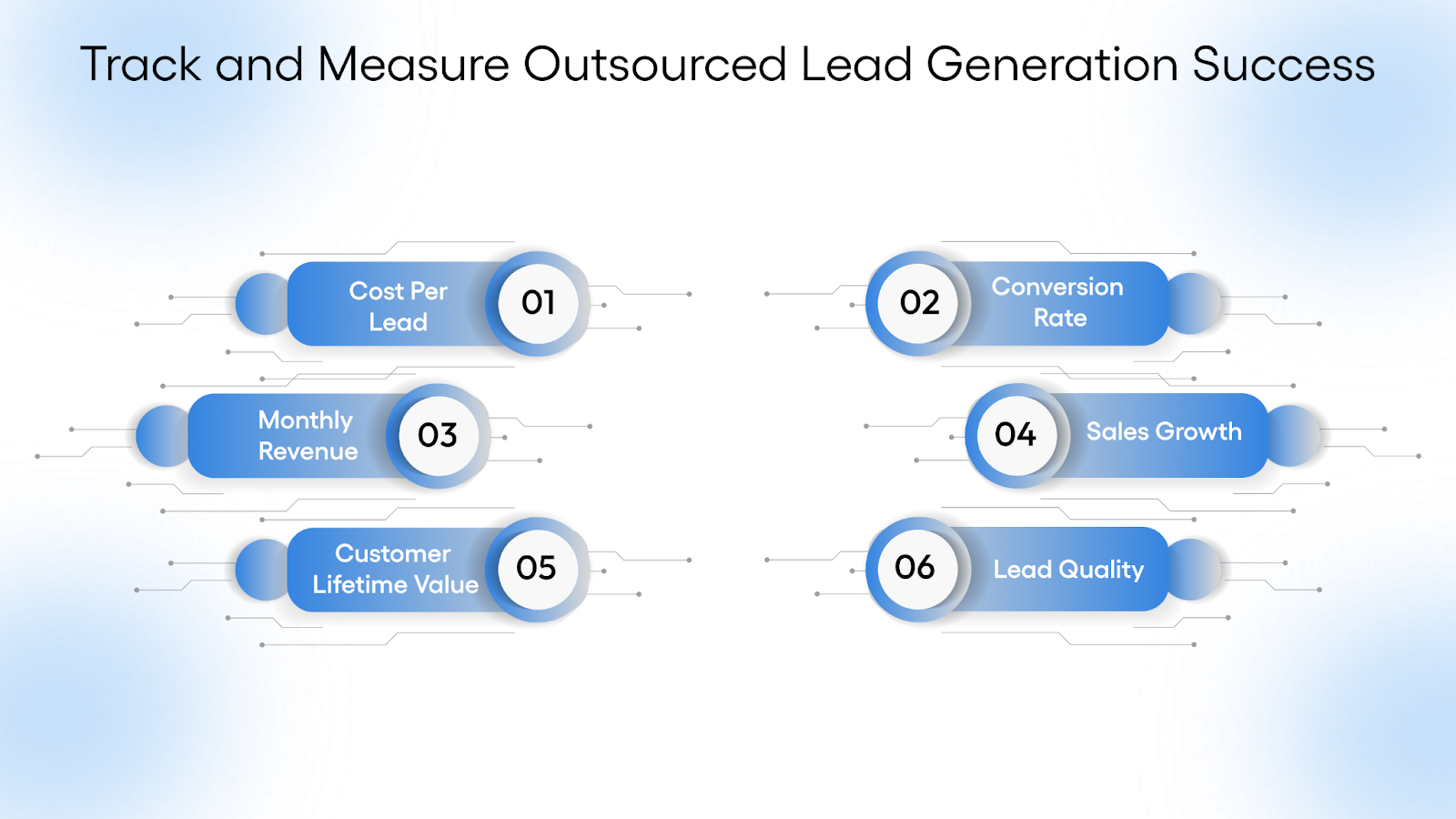
Outsourcing lead generation can be a powerful way to accelerate your sales process, but measuring its effectiveness is important. Without tracking key metrics, it's difficult to assess the success of your investment and optimize the results. Let’s break down how to track and measure outsourced lead generation success effectively.
1. Cost Per Lead (CPL)
CPL calculates the cost associated with generating each lead. It’s a key metric to evaluate the cost-effectiveness of your outsourced efforts. Tracking CPL ensures that your outsourced lead generation aligns with your budget and provides the right monthly recurring revenue (MRR).
How to calculate:
Total cost of the lead generation campaign ÷ Total number of leads generated.
2. Lead Conversion Rate
This metric monitors the conversion rate of leads into sales-qualified prospects or paying customers. A high conversion rate means that your leads are not only being generated but are also of high quality. This reflects the success of your partner in delivering valuable prospects.
How to calculate:
Number of qualified leads converted ÷ Total leads generated × 100.
3. Monthly Recurring Revenue (MRR)
MRR is crucial for businesses focused on long-term profitability. Measuring the revenue generated through leads over a month provides insight into how well lead generation impacts business growth.
How to calculate:
The sum of monthly payments from new clients gained through the lead generation process.
4. Sales Growth
Track the increase in your sales figures after outsourcing. Sales growth indicates that the lead generation efforts result in closed deals and growing revenue.
How to calculate:
Compare sales figures before and after outsourcing. Measure the percentage increase in sales volume.
5. Customer Lifetime Value (CLV)
CLV measures the total revenue you expect from a customer throughout your relationship with them. It is vital to understand the long-term value of leads generated through outsourcing. High CLV indicates that your outsourcing partner is providing high-quality, loyal customers.
How to calculate:
Average purchase value × Purchase frequency × Customer lifespan.
6. Lead Quality
Lead quality measures how closely the leads you generate match your ideal customer profile (ICP). This is often measured by the number of leads that convert into sales-qualified leads or customers.
How to measure:
Regularly review the leads’ demographic and firmographic data, ensuring they match your ICP.
Measuring the success of outsourced lead generation is essential to ensure you’re getting the value you expect.
Boost Your MRR with TLM’s Targeted Lead Generation
Effective lead generation is crucial for increasing your Monthly Recurring Revenue (MRR). At TLM, we help businesses streamline their lead generation process by delivering high-quality leads that are ready to convert. Our targeted approach ensures your sales team engages with the right prospects at the right time, optimizing your sales pipeline.
- Sales Qualified Leads (SQL): TLM provides leads that are aligned with your business goals, ensuring a higher chance of conversion.
- Appointment Scheduling: We handle appointment setting, ensuring your sales team meets only with qualified prospects.
- Demand Generation: We engage and nurture prospects through multi-channel strategies, keeping them ready to convert.
- Targeted Campaigning & ABM: TLM crafts personalized outreach strategies that target high-value accounts, increasing conversion potential.
- Real-Time Dashboard: Our proprietary tools provide real-time insights, optimizing communication and follow-up strategies.
At TLM, we don't just generate leads; we focus on boosting your MRR by delivering high-quality, targeted opportunities that align with your growth objectives. With years of experience working with MSPs across North America, Australia, and Canada, we ensure your outreach efforts drive real revenue growth.
Want to see it in action? Book a Meeting to discuss how we can boost your MRR with precise, result-driven lead generation.






